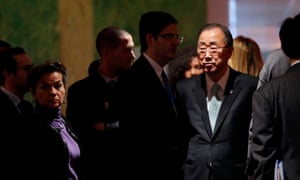Extract from The Guardian
As summit enters closing stages, UN secretary
general urges negotiators to set aside national interests to reach a
strong global deal for all
UN secretary general Ban Ki-moon, with UN climate
chief Christiana Figueres (L), at the COP21 climate change conference
in Paris, France. Photograph: Stephane Mahe/Reuters
Adam
Vaughan in Paris
Saturday 12 December 2015 00.23 AEDT
The UN secretary general Ban
Ki-moon has said the international climate talks that are edging
towards a conclusion in Paris have been the most complicated and
difficult negotiations he has ever been involved in.
Ban said that
differences still remain among the nearly 200 governments
searching for a climate deal in Paris but he urged negotiators to set
aside their national interests to reach a compromise.
“This is not a moment of talking about national
perspectives. A good global solution will help good local solutions,”
he said. “I am urging and appealing to all the state parties to
take the final decision for humanity.”
“I have been attending many difficult
multilateral negotiations, but by any standard, this negotiation is
most complicated, most difficult, but most important for humanity. We
have just very limited hours remaining,” he added.
Ban was speaking as a fortnight of negotiations
near their end, with governments
seeking a legally-binding deal on curbing carbon emissions beyond
2020, when current commitments end. Around 150 leaders including
Barack Obama and Xi Jinping, of the world’s two biggest emitting
countries, attended the summit at the start but have since made way
to politicians and negotiators who kept talking through Wednesday and
Thursday nights.
“We are almost at the end of the road,” said
Laurent Fabius, the French foreign minister and president of the
talks, who had stayed up into the early hours of Friday after a
draft deal was published on Thursday night. He confirmed that a
new draft text would
be published on Saturday at 9am CET, rather than Friday evening
as originally planned.
The leading economist Lord Stern said that despite
the delays, relations between governments were much better than at
previous summits.
“The atmosphere between the parties has been the
best that I have seen in the last 10 years of COPs [Conference of the
Parties, the name of the major annual UN climate summit]. That’s
founded on the recognition of the magnitude of the risks, and
recognition of how we combine poverty reduction, development and
climate responsibility: that’s been a key element in the spirit
we’ve seen here.”

Global development podcast Paris climate talks turn up the heat on world leaders – podcast
The Guardian
environment editor John Vidal reports from the UN climate change
conference in Paris, where gritty but positive negotiations to broker
an agreement are nearing a conclusion
Listen
Michael Jacobs, who was Gordon Brown’s climate
adviser and now works for the New Climate Economy, said the biggest
differences overnight were on transparency and finance.
“But there is no reason to see why countries
shouldn’t resolve those,” he said. “I don’t read anything
into this extra delay.”
Protests are planned across Paris on Saturday,
with thousands of red tulips to be given out by civil groups to
represent red lines they say should not be crossed, and a rally under
the Eiffel Tower when a deal is reached.
“There is still a lot of work ahead,” said
Tasneem Essop, WWF’s head of delegation to the Paris talks.

No comments:
Post a Comment